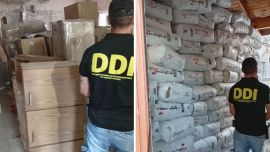Unionists within the ruling Frente de Todos coalition are pushing for a bill that would create a so-called 'Impuesto Patria' ("Homeland Tax") for high-earners, in a bid to boost government coffers amid the coronavirus pandemic.
The proposal would see the creation of a one-off levy for individuals who have assets of more than 10 million pesos (approx. US$153,000 at current exchange rate) or qualify with a "profiltability" of more than 50 million pesos, according to the text of the bill.
The aim of the tax is to finance the Argentine health system in the midst of the coronavirus crisis, lawmakers said. The initiative introduces changes in personal property taxes and was promoted by legislator Vanesa Siley, a Kirchnerite lawmaker from the ruling party's unionist wing. According to reports, it was initially proposed by Peronist unionist Carlos Cisneros. Lawmaker and general secretary of the Central de Trabajadores de la Argentina (CTA), Hugo Yasky, is among the signatories.
The government says it does not support the legislation at present, which comes just a week after cacerolazo pot-banging protests demanded lawmakers slash their own salaries amid the crisis.
Strictly speaking, the bill establishes "a tax for any human person or undivided inheritance reached by Article 17 of law 23,966 -– on assets existing as of March 31, 2020 that exceed ten million pesos. ($10.000.000)".
According to the proposal, "the encumbrance to be paid by the indicated taxpayers" shall be “1.25 percent for assets registered in the national territory, and 1.75 percent for assets registered abroad."
The initiative also seeks to establish "a tax on any human or legal person, reached by the Income Tax, Law 20,628. T.O. Decree 649/97, whose net income exceeds fifty million pesos ($50,000,000), according to data collected by official agencies."
"The purpose of this Bill is to establish an exceptional tax, within the framework of Preventive and Compulsory Isolation, in order to distribute essential resources to guarantee the socioeconomic well-being of the most vulnerable sectors of our country," reads the text of the bill.
"In this way, it attempts to contribute to the situation of extraordinary gravity determined by the Covid-19 [virus], establishing an exceptional tax for those who have greater contributory capacity. A greater effort is requested from those who are in better conditions – a basic rule of solidarity," the text details.
Other initiatives
The project arises alongside various initiatives by the government to increase revenue among the wealthiest sectors of society in the face of the pandemic.
Yasky, speaking to state news agency Télam, said he hopes that the project will be unified with an existing proposal led by fellow lawmaker Carlos Heller that would tax "the large estates" of the richest one percent of the population.
"The State does not have the resources that are required," Yasky sid. "The idea is to discuss what role should be played by those who amassed great fortunes, in the context of a crisis that will leave an enormous economic footprint of poverty.”
The union leader said that "it is a matter of the 50 owners of Argentina's fortunes contributing.”
In this sense, he remarked: "That list is headed by Paolo Rocca, from Techint, and all together they collect [US$]70 billion dollars a year. Former president Mauricio Macri is 37th on that list. If they only contributed 1.5 percent, they would raise [US$]1.05 billion dollars, the equivalent of 90,000 ventilators or one million hospitalisations in intensive care. If I were with them for one minute, I would put them in a car and take them to La Matanza," he said.
Exceptional tax
As Perfil reported a few days ago, the government is also working on an extraordinary tax on the assets of Argentina's large economic groups. Officials are probing the idea of a levy on the top one percent of the population, potentially also targeting big corporations, banks, insurance companies and supermarket chains, among others.
Heller, the president of the Budget Committee of the Chamber of Deputies, argued this week that the project is "the only way to generate extraordinary resources" that the State needs to face the health emergency and mitigate the advance of the coronavirus.
At the same time, the government also suggested a bill that would slap an additional levy on those who utilised Mauricio Macri's white-washing 'blanqueo' scheme to legally bring home funds stashed overseas. The idea is backed by Máximo Kirchner and supported by President Alberto Fernández, according to reports.
- TIMES/PERFIL



















Comments